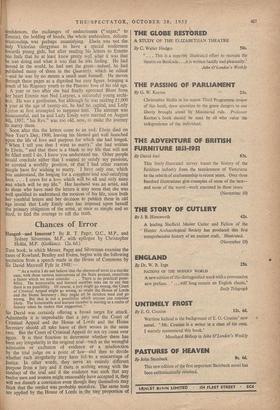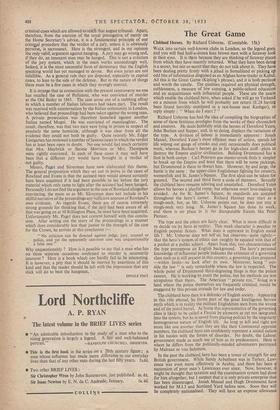Chances of Error
Hanged—and Innocent ? By R. T. Paget, Q.C., M.P., and Sydney Silverman, M.P., with epilogue by Christopher Hollis, M.P. (Gollancz. 12s. 6d.) THIS book, in which Messrs. PaRst and Silverman examine the cases of Rowland, Bentley and Evans, begins with the following quotation from a speech made in the House of Commons by Sir David Maxwell Fyfe in 1948 : - " As a realist I do not believe that the chances of error in a murder case, with these various instruments of the State present, constitute a factor which we must consider. . . . There is no practical possi- bility. The honourable and learned member asks me to say that there is no possibility. Of course, a jury might go wrong, the Court of Criminal Appeal might go wrong, as might the House of. Lords and the Home Secretary : they might all be stricken mad and go wrong. But that is not a possibility which anyone can consider likely. The honourable and learned member is moving in a realm of fantasy when he makes that suggestion." - Sir David was certainly offering a broad target for attack. Admittedly it is improbable that a jury and the Court of Criminal Appeal and the House of Lords and the Home Secretary should all take leave of their senses in the same case. But the Court of Criminal Appehl do not try cases over again. It is their function to determine whether there has been any irregularity in the original trial—such as the wrongful admission or exclusion of evidence or a misdirection by the trial judge on a point of law—and then to decide Whether such irregularity may have led to a miscarriage of Justice. In other words, they serve an entirely different purpose from a jury and if there is nothing wrong with the conduct of the trial and if the evidence was such that any twelve men and women might reasonably have accepted it, they will not disturb a conviction even though they themselves may think that the verdict was probably mistaken. The same tests are applied by the House of Lords in the tiny proportion of criminal cases which are allowed to reach that august tribunal. Apart, therefore, from the exercise of the royal prerogative of mercy on the Home Secretary's advice, it is a fundamental principle of our crim4lal procedure that the verdict of a jury, unless it is obviously perverse, is sacrosanct. Here is the strongest, and in my opinion the only valid, argument against hanging. A jury may go wrong and, if they do, an innocent man may be hanged. This is not a criticism of the jury system, which in the main works astonishingly well. Indeed, it is the most successful form of democracy that the English speaking world has yet managed to devise. But even juries are not infallible. As a general rule they are disposed, especially in capital cases, to lean to the side of the defence. But in the nature of things there must be a few cases in which they wrongly convict.
It is strange that in connection with the present controversy no one has recalled the case of Pellizioni, who was convicted of murder at the Old Bailey in 1865. The case arose out of a stabbing affray in which a number of Italian labourers had taken part. The result was received with consternation by the Italian community in London, who believed that proceedings had been taken against the wrong man. A private• prosecution was therefore launched against another Italian named Mogni. He was convicted of manslaughter. The result, therefore, was that two men were lying in prison in respect of precisely the same homicide, although it was clear from all the evidence they could not both be guilty. Quite recently Mr. Edgar Lustgarten has reviewed a number of famous cases in which the verdict has at least been open to doubt. No one would feel much certainty that Mrs. Maybrick or Steinie Morrison or Mrs. Thompson were rightly convicted. In each of these cases it may well have been that a different jury would have brought in a verdict of • not guilty. Messrs. Paget and Silverman have now elaborated this theme. The general proposition which they set out to prove in the cases of Rowland and Evans is that the accused men would almost certainly have been acquitted if it had been possible to lay before the jury material which only came to light after the accused had been hanged. Personally I do not find the argument in the case of Rowland altogether convincing, the more so as Mr. Silverman does not include in his skilful narrative of the proceedings any sufficient account of Rowland's own evidence. As regards Evans, there are Of course extremely strong grounds for thinking that, if the jury had been aware of all that was going on at 10 Rillington Place, he must have been acquitted. Unfortunately Mr. Paget does not content himself with this conclu- sion. After setting out the story of the proceedings in a manner which. does considerably less than justice to the strength of the case for the Crown, he arrives at this conclusion :- " No criticism can be directed against judge, jury, counsel or police, and yet the apparently cast-iron case was unquestionably' ' a false one.'
Why unquestionably ? How is it possible to say that a man who has on three separate occasions confessed to murder is necessarily • innocent ? Here is a book which can hardly fail to be interesting. It is however, a pity that it should be marred by assertions. of this kind and that the reader should be left with the impression that any stick will do to beat the hangman.
DINGLE FOOT



































 Previous page
Previous page